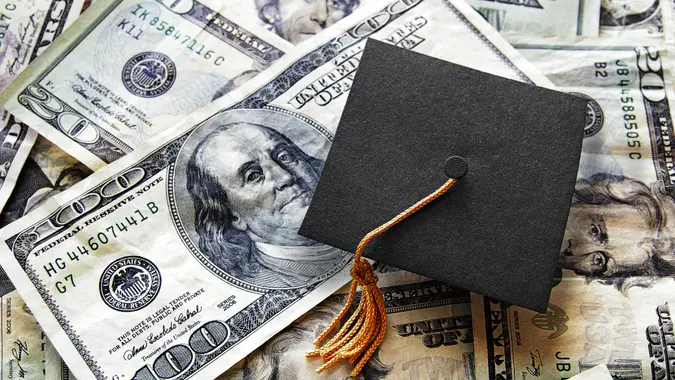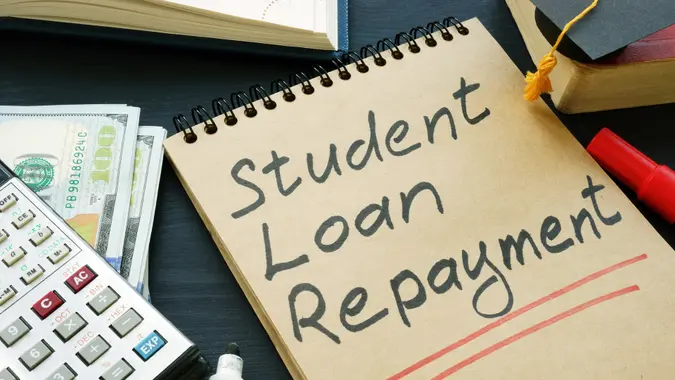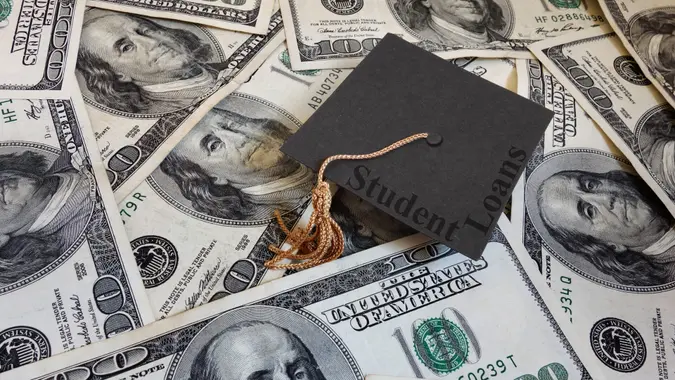7 Expert Tips To Pay Off Your Student Loans in 1 Year

Commitment to Our Readers
GOBankingRates' editorial team is committed to bringing you unbiased reviews and information. We use data-driven methodologies to evaluate financial products and services - our reviews and ratings are not influenced by advertisers. You can read more about our editorial guidelines and our products and services review methodology.

20 Years
Helping You Live Richer

Reviewed
by Experts

Trusted by
Millions of Readers
In late July, the Biden administration announced that up to 25 million borrowers will soon receive an email about student debt relief options. According to the Department of Education, the new proposed rules would be in addition to the $168 billion in student loan relief that the administration has already approved.
If you have student loans, keep an eye out for that email. If you qualify for some sort of student loan relief, you could pay off your student loans faster — possibly even within the next year — and save yourself some interest.
There are good and not-so-good ways of going about paying down student loans in a short time period. Ideally, you’ll be able to pay down your loans without having to cut back in other areas. Better yet, you might be able to find options that can help you qualify for other kinds of debt relief.
Create a Budget
“It’s important to make a budget with a plan on how you will pay back your student loans,” said Angela Colatriano, the chief marketing officer at College Ave Student Loans. “The more money you can put toward your student loan payments, the quicker you can pay off your debt and the less you’ll pay in interest.”
If your goal is to pay off student loans in the next year, you should consider applying any extra money you have coming in towards this debt. Every dollar matters, and you may want to think about using your bonus or side hustle money to become debt-free sooner.
Refinance Your Student Loans
“Student loan refinancing can lower your monthly payments, reduce the overall cost of the loan and, in some cases, both,” said Colatriano.
If you want to pay off your student loans in one year or a relatively short period of time, you’ll want to look into refinancing to get better terms and accelerate the process.
Colatriano added, “Be careful before refinancing federal student loans with private, as federal student loans often come with unique benefits, such as income-based repayment plans and student loan forgiveness.”
Income-Driven Repayment (IDR) Plan
“If your current payment plan is unmanageable, consider switching to an IDR plan,” said Taylor Kovar, a CFP and founder of 11 Financial. “These plans adjust your monthly payments based on your income and family size. While this may extend your loan term, it can provide immediate relief and help you stay on track with payments.”
Borrowers who repay their loans under an IDR plan can have remaining balances forgiven after making a certain number of payments over a certain period of time. IDRs are designed to make your student loan debt more manageable by giving you a monthly payment based on your income and family size, according to Federal Student Aid. This is a good option if your outstanding federal student loan debt represents a big portion of your income.
While this method may not help you pay off your loans faster if you aren’t close to meeting the requirements for forgiveness on the remaining balance, you could get there within the year if you’re close.
Public Service Loan Forgiveness (PSLF)
“If you qualify for Public Service Loan Forgiveness (PSLF), it is often the best option, offering tax-free loan forgiveness after ten years of qualifying payments,” said Andrew Latham, a CFP and managing editor at Supermoney.com.
If you work full-time for a government or not-for-profit organization, you might qualify for forgiveness of the entire remaining balance of your Direct Loans after you’ve made 120 qualifying payments, or ten years’ worth. To benefit from PSLF, Studentaid.gov states you should repay your federal student loans under an IDR plan. Again, this is most helpful for paying off your loans within a year if you’ve already made significant progress.
Also, if you’ve been denied loan forgiveness under PSLF because one or all of the payments you made on your Direct Loans were under a nonqualifying repayment plan, you might be eligible for Temporary Expanded Public Service Loan Forgiveness.
Teacher Loan Forgiveness
“If you’re a teacher working in a school serving a low-income area, you will want to look into Teacher Loan Forgiveness, which provides up to $17,500 for eligible teachers,” Latham said.
This option is available to federal student loan borrowers who teach full-time for five complete and consecutive academic years in certain elementary or secondary schools — or work at educational service agencies that serve low-income families. If you qualify, you might be eligible for forgiveness of up to a combined total of $17,500 on eligible federal student loans, which could help you pay off your balance in the next year.
Declare Bankruptcy
This is not the route you want to take if you can possibly avoid it. Declaring bankruptcy to get out from under your student debt will ding your credit score and make it more difficult to get loans in the future.
Before considering bankruptcy, you need to understand the rules governing federal student loans. According to Federal Student Aid, you can have your federal student loan discharged in bankruptcy “only if you file a separate action” known as an “adversary proceeding.” With this action, you request that the bankruptcy court find that repayment would impose undue hardship on you and your dependents.
Hold Off on Saving for Retirement
Another option is to pause making contributions to your 401(k), IRA or other retirement account and put that money toward student debt. But you should do everything in your power to avoid this strategy. Saving for retirement is one of the most important financial moves you can make — and sticking diligently to your retirement plan should be a high priority, according to financial experts.
If you’re young, you might decide to put retirement savings on hold for a year to pay down student debt. This makes some sense, because you have plenty of time to make up the shortfall. But a better option is to figure out ways to cut down on discretionary spending and put those savings toward your student debt, instead.
Martin Dasko contributed to the reporting for this article.
 Written by
Written by  Edited by
Edited by 
























